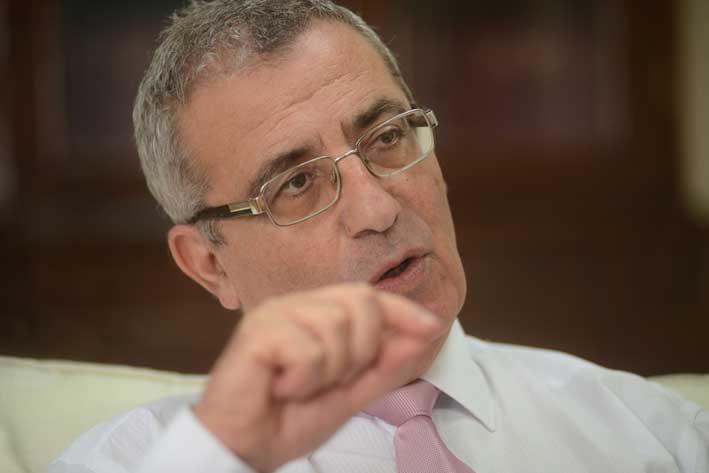Education Minister Evarist Bartolo tells The Malta Independent on Sunday that the current sanctions in relation to absenteeism are not being taken seriously by a number of parents.
“I have had people who sit on the tribunal telling me they feel ridiculed. Even if they scold parents, telling them they are irresponsible by not sending their children to school, and fine them, some parents just run up the fines and don’t pay. They don’t take the system seriously.”
The minister was being interviewed about a recently introduced package of legislative changes for the education sector, with three bills currently open for public consultation and more on the way.

“On one hand we need to be stricter and send the message that neglecting a child’s right to attend school is not acceptable, and that it is their duty to ensure the child attends school. But in most cases these are families experiencing poverty, where the parent or parents are on social assistance. I’ve seen statistics that show that children who usually don’t attend school come from poor families, where the parents are unemployed and are already socially excluded, and who feel that attending school is not important as it won’t result in any change.
“One might ask: would you make life more difficult for them by saying that this is a criminal offence? What we need to discuss, and I’ve already started discussing it with my colleagues, is the importance of being very sensitive, in the sense that if we know absenteeism is tied to social exclusion and poverty, let’s not make hell more hellish by creating more problems for these families.
“The onus is on us to provide an educational experience where they don’t feel the need to be dragged to school. We need to have a proper discussion about absenteeism, social exclusion and poverty. Most absenteeism is related to boys more than girls, secondary school students more than primary students and people in a low elementary job situation or unemployment, which means that in most cases, our educational experience is not interesting and relevant enough for them to want to come to school. This is something we will try to deal with not simply through legislation, but by trying to provide a flexible educational programme in schools that tries to reach all children”.

“On the one hand we want to send the message that it is a criminal offence not to send your kids to school, but at the same time this will increase our responsibility to ensure that the educational experience is relevant even for hard to reach children.”
The Minister was asked why he saw the need to revamp the education legislation.
“We live in a very dynamic society, in a world that is changing. When talking about education, we usually say we are preparing for the future and not just living for today. In such a situation the only constant is change. These new Acts will try to introduce more democracy in schools, more democracy in the relationship between the head office and schools. I call it the decolonisation of schools, by making schools independent. In order for schools to succeed, they need to be able to run themselves, and not simply obey orders from above. The proposed law sets out to change the old tradition of command and control, where schools are being told what to do.
“On one hand it will see more independence and democracy, and on the other hand with the legislation relating to regulation, we are introducing a regulatory framework for all schools, be they state, church or independent schools. Currently, church and independent schools must show that they are capable of delivering what is expected of them in order to have a licence.

“Previously, if one wanted to set up a school before, they would have had to go through a whole process. If one looks at all the debate we’ve had this past year regarding university licencing, we also need that for schools. They need to show that their house is in order, that they have the required standards and are delivering. Up until now, state schools had nothing to worry about. Through this legislation, state schools will also be subjected to the same rigorous external quality assurance checks like independent and church schools. In current legislation, there is a sense of quality assurance; however the contradiction exists where the state is both the provider and regulator. This is going to change.
“We are setting up the National Commission for Education which will regulate all sectors (independent, church and state), to ensure they are of the right standards etc, and this will be done by an external organisation, not the ministry. There will be audits and recommendations as to what schools would be required to improve on.”

LSAs and KGAs
The legislation, if approved as is, will certainly bring about some changes for Learning Support Assistants (LSA) and Kindergarten Assistants (KGA).
Minister Bartolo explained that there is a Council for the teaching profession, which is solely for teachers. “When talking about schools as inclusive democratic communities, one would need to include everyone. Teachers required a warrant, but an LSA or a Kindergarten Assistant doesn’t even exist for the Council. We cannot have this caste system, where some educators are more important than others.”
He highlighted a rather troubling situation, where Supply Learning Assistants already work in schools but are not yet LSAs. “This is not acceptable. If we want the best educational service for our children, how can we send LSAs to schools without them knowing what autism is, what ADHD is, what skills are needed to deal with these children. We are setting up a situation where all those who work in schools to help these children are trained before being sent”.
He spoke about the need to find ways to ensure that “we invest in the professional development of LSAs. The current system, while allowing time for teachers to develop themselves professionally, does not have any time allotted to LSAs and KGAs for professional development. If they are part of the educational experience, then they should have this time and we should invest in their training and professional development. We will try and find ways to ensure they achieve this. As to whether they will be required to have more qualifications, at present all I can say is that most LSAs would like the opportunity to move beyond Level 4 accreditation and achieve a Level 6, which is a degree. If in the coming years a teacher would require a Masters, I think all others involved in the educational experience should have their qualifications enhanced.”
Back in 2011, Minister Bartolo had spoken about increasing the number of schooldays. Asked if this was still part of the plan, he said: “No, we are increasing the educational experience instead. Activities outside normal school hours have increased through initiatives taken by schools. They have clubs, meeting two or three times a week where they carry out programmes which complement and in some cases improve what is provided through the framework of formal education. We need to start accrediting informal and non-formal education, giving it a value in the educational experience. As an example, there are a number of ongoing programmes in schools which provide our children with life-skills, but they are not accredited”.

Life skills
“We are a contradictory country. We say we are too obsessed with exams, yet they are the ones that are mostly recognised. Other forms of skills earned through non-formal and informal learning are not given any weight and this is a mistake. We also need life skills, to know how to solve problems, work with others.
“If we have accreditation of non-formal and informal learning for those beyond the age of 18, why don’t we have it for those under the age of 18? Parents make a personal sacrifice when they take their children to the theatre for example, but then we tell them to drop everything come exam-time. Yes, make sure literacy and numeracy are there, but let’s also have the rest.”
The minister spoke about the promise for student impact assessments to be conducted when new policies affecting students are drawn up. “We’re putting ourselves up for a tough challenge with this, and I would say you probably would not find this in any other education act worldwide. What one would often find in such documents is a lot of talk relating to education being student-centred, but in actual fact the weakest voice when it comes to educational decisions at a national level is that of students.”
He said that there is good practice in this regard which the government can build on. “We are now ensuring the presence of student councils in every school. If we want to instil the democratic process in children, the best way is for them to put this into practice, where children respect each other and work together.” He stressed that schools which hear their students’ voices when drawing up their school development plans, things run better as those involved are fully participating.
“In September, we will be organising a student’s national conference, involving students from primary up to university level, and also those in life-long learning and these student impact assessments will be discussed.”

The need for more international schools
Turning to the Prime Minister’s statement that “Private schools on the island are at saturation point which is an issue that has been flagged by potential foreign investors”, Minister Bartolo said that when a country like Mala tries to attract foreign investment, a major variable in the equation is the availability of international schools. “If you attract companies who need to bring in staff from overseas, they will ask about the availability of international schools. There is very low unemployment in Malta, and the only way the economy could grow and that jobs created can be filled is through bringing in workers from overseas. Unfortunately there is only one international school in Malta. I have told my colleagues to keep this in mind when targeting investment, as investors will ask about international schools. “International schools in Malta have existed as an enclave from the educational system, thus very few Maltese parents send their children to international schools.
“We are talking about international schools that offer and deliver syllabi, curricula and accreditation at an international level. When it comes to accreditation, Maltese university degrees are recognised globally. But when it comes to kindergarten, primary and secondary, there is no international accreditation system which allows, for example, Sweden and Malta to mutually recognise each other’s level. Recognition of compulsory school-age education is still exclusively national, thus investors need international schools which deliver international curricula, like the International Baccalaureate.”